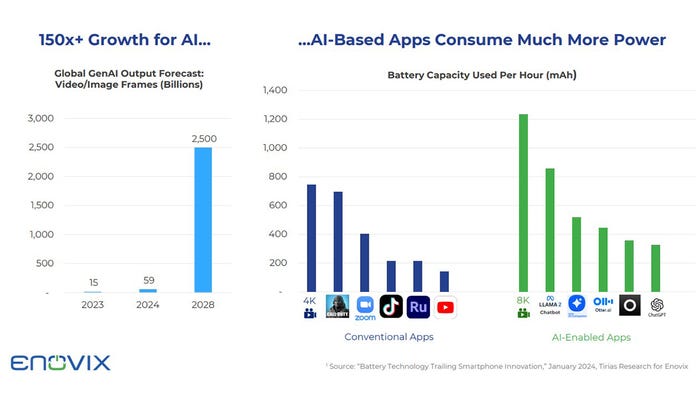Enovix introduces the AI-1 battery, designed to meet the energy demands of AI-class smartphones with advanced features.
Maria Guerra, Senior Editor-Battery Technology, Informa Markets Engineering July 8, 2025
Silicon-anode batteries represent a transformative advancement in energy storage technology, particularly for smartphones, which demand ever-increasing power and efficiency to support modern functionalities. Unlike traditional lithium-ion batteries that use graphite anodes, silicon-anode batteries leverage silicon’s significantly higher energy storage capacity, enabling greater energy density and longer battery life. This innovation is particularly critical for smartphones, as they continue to evolve into powerful devices capable of running artificial intelligence (AI) applications, high-resolution displays, and advanced connectivity features.
Expanding the potential of silicon-anode technology, Enovix Corporation has launched its AI-1 platform, a silicon-anode battery designed to meet the energy demands of AI-class smartphones. These devices go beyond basic smartphone features by leveraging AI algorithms and computational power to enhance user experience, performance, and features such as enhanced photography, real-time translation, and adaptive learning. AI-class smartphones include the Samsung Galaxy S25 Ultra, the Google Pixel 9 Pro/XL, and the Apple iPhone 16 Pro Max, among others.

Growth of AI apps threatens all-day smartphone battery life. Courtesy of Enovix.
Enovix’s AI-1 platform capabilities
According to Enovix, its patented architecture offers higher energy density and improved performance, enabling devices to support advanced AI functionalities while maintaining reliability and safety. Enovix’s AI-1 battery — which was announced 190 patents protect it — features a 100% active silicon anode; a feat that overcomes the traditional challenges of silicon swelling without compromising safety or longevity.
Related:7 Cutting-Edge Electric Lawn Mowers on the Market in 2025
After a two-year delay, changing the anode (five times), the cathode (three times), the electrolyte (ten-plus times), and even the stainless-steel constraint and separator the company claims it can offer a battery with the highest energy density commercially available today exceeding 900 watt-hours per liter (Wh/L).
The AI-1 battery delivers 7,350 milliampere-hours (mAh) of capacity, enabling smartphones to support advanced AI functions without frequent recharging. “Enovix invented technology that led the industry in energy density for wearables in 2023 thanks to our unique architecture and the use of 100% silicon-anode technology,” stated Dr. Raj Talluri, CEO of Enovix. “With the launch of AI Class technology, we are now sampling production AI-1 batteries to those customers who demand not only industry-leading energy density, but have other stringent requirements for cycle life, fast charging, and safety. Enovix is now positioned to support the next generation of smartphones in a 1.2-billion unit market.”
Related:Infineon Unveils Advanced BBU Technology for AI Datacenters
The AI-1 battery can charge to 20% in just five minutes and 50% in 15 minutes, while maintaining over 900 charge cycles under standard smartphone usage. It also excels in high-discharge scenarios across a wide temperature range, ensuring reliability for AI-intensive tasks. “The AI Class technology is a breakthrough in utilizing the significant but difficult-to-realize benefits of silicon anodes to win in the AI Class smartphone market,” stated T.J. Rodgers, chairman of Enovix.

AI-class smartphones can offer improved photography features and real-time translation capabilities. Courtesy of gece33/iStock / Getty Images Plus.
The AI-1 battery was built in their Malaysian production facility with a volume of just 1.79 cubic inches, holds 26.3 watt-hours of energy — enough to lift a 4,948-pound truck to a height of 4.7 feet three times on a single charge. This demonstration underscores the immense energy density and power of the AI-1 platform. “Humans cannot comprehend the high rate of energy use in the AI world because it is dissipated invisibly by charging and discharging the 100 billion transistors on a modern AI chip,” Rodgers explained.
Enovix has already shipped its first AI-1 batteries to a leading smartphone OEM, with broader availability expected later in 2025. The company’s Malaysian production facility is poised to scale manufacturing, leveraging over a decade of R&D and $200M in funding. The future of batteries for AI smartphones lies in the continued development of technologies that strike a balance between higher energy density, faster charging, and long-term reliability.
Related:V2G Collaboration Explores Grid Benefits as Market Grows
With smartphone sizes having essentially reached their maximum, further improvements in battery performance must come from advancements in energy density rather than physical size. As AI applications become increasingly integral to mobile devices, the demand for batteries that can support these power-intensive functions will continue to grow. Innovations like silicon-anode technology, as demonstrated by Enovix’s AI-1 platform, highlight the potential for batteries to not only meet but exceed the performance requirements of AI-class smartphones.